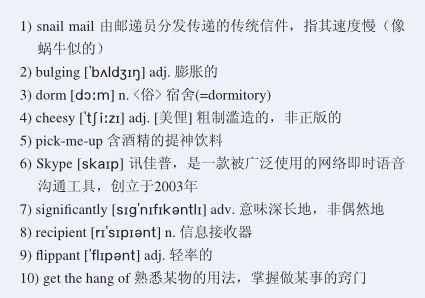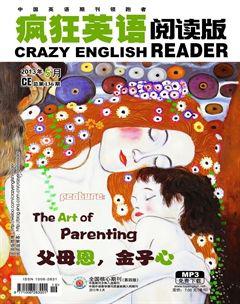以吻封缄?——英美交流也抓狂
by Sophie Pitman



I love letters. 1)Snail mail is my preferred method of communication. There is nothing like opening up my mailbox to find a 2)bulging envelope, covered in stamps and addressed with familiar handwriting. Written communication is a wonderful thing, especially when living as a lone expat with family, friends and partner remaining back on British soil.
When I first moved to the United States, I had no suitcase space for prints and posters, so I issued a plea to my friends to send postcards with which I would decorate my room. My nearest and dearest answered the call, and I enjoyed seeing my 3)dorm room walls gradually fill up with artworks, 4)cheesy holiday vistas, and witty slogans. Little notes and hellos from my loved ones keep me going, and were a real 5)pickme-up in the early days when homesickness loomed.
Now, a little more seasoned, I still adore my postcards and letters. Postcards are now limited to one large frame and, of course, my fridge, where I keep them on regular rotation. But they are still much loved, and when received, take pride of place in my kitchen.
我喜欢信件。传统邮递信件是我更为喜爱的通讯方式。打开信箱,发现一个鼓鼓的信封,上面贴着邮票,写着熟悉的字迹,没有比这样更惬意的事情了。书面交流是一件很美妙的事情,尤其当你独在异乡,家人、朋友、伙伴都在英国本土时。
初来美国,我的行李没有多余的位置放印刷品或海报,所以我请朋友们帮忙寄一些明信片过来以装点房间。我最亲密的朋友满足了我的心愿,我喜欢看着我宿舍的墙壁渐渐布满艺术画作、俗气的假日风情画和睿智的标语。早期思乡情浓,出自吾爱之手的小小便笺和问候使我得以继续前进,打起精神。
如今人变得成熟些了,但我仍非常珍爱我的明信片和信件。现在明信片只限贴于一个大相框中,还有,当然就是贴在冰箱外,我定期会对其进行更新。然而,它们仍在我心中占据着重要一席,刚刚收到时它们都会被置于厨房最显眼的位置。
Dont get me wrong, I could not survive without 6)Skype. I adore being able to chat face to face for free. I also spend countless hours a week on Facebook and Twitter, staying in touch with old friends and keeping up with what is going on back in the UK. How anyone coped with being an expat in the days before the Internet, I do not know. I applaud you.
Most of my communications, however, are by email. Like almost everyone, I use email for both my personal and work lives. Although I have been using email for many years, since coming to the US, my email style has had to shift 7)significantly. And as I just discovered, there are still rules I need to learn.
It took me a while to get used to the informal tone adopted by many of my American peers. My emails were sometimes read by their 8)recipient as cool or brusque, while I often felt responses brief or 9)flippant. I could be overly polite, and called my tutors “Dr,” rather than “Professor” as is common here. When I 10)got the hang of addressing my superiors correctly, and relaxing my tone, I confused everyone by signing off with a casual “cheers.”

别误会,我承认,没了讯佳普,我是活不下去的。我喜欢可以免费“面对面”的交谈。我每周也在脸谱网和推特微博上耗费无数个小时,跟老朋友保持联络,更新英国那边的资讯。我不知道互联网还没发明以前身在异乡的人们是怎么活的。我为他们鼓掌。
然而,我大多数的交流都是通过电邮完成的。跟几乎所有人一样,我在私人生活和工作中都使用电邮。虽然用电邮已是老手了,但自从来到美国后,我的电邮风格不得不作出明显的转变。而且我发现,要学的规矩还有很多呢。
我花了好些时间才习惯美国同龄人所常用的轻松口吻。我的电邮有时会给他们一种冷淡或生硬的感觉,与此同时我则常常觉得他们的回应简短轻率。我会被认为过于有礼,我称呼我的老师为“博士”,而非像这里常用的“教授”。当我把握了对上级的正确称谓,并以轻松的口吻,用“cheers”一词结束电邮时,却使得人感到莫名其妙。
Rather than reading this as a brief “thanks” at the end of the email, I soon discovered that some of my American correspondents were 11)perplexed when I seemingly toasted them at the end of the email. Us Brits have something of a reputation as 12)boozers, which I suppose I did not help by implying that I might be downing pints as I signed off my morning emails.
Now three years into graduate study here in the US, I thought I had it nailed. But today I discovered one thing I have been getting wrong for years. I think nothing of signing off a text or email to a friend with a “x.” Usually I opt for a casual single “x,” sometimes I go for two, and when I am overly keen or in need of a favour, my recipient is treated with a triple “xxx.” Between British friends, even those who would never 13)contemplate kissing in person (on the cheek or otherwise), signing off with a kiss or three is no big deal. But my casual “x”s (to friends, mind you, never professors) have never elicited a response from my US friends—on facebook, email, or text.
Whilst none seem offended by what must be interpreted as an overly 14)amourous farewell, it just is not the done thing over here.
I am not, in person, a kiss-y person. As a child, I would wipe unwanted kisses from my cheeks as soon as relatives turned away. Even on the continent, where I am constantly confused by how many kisses to give as a greeting (when is it two or three?), I am slightly embarrassed by the 15)over-familiarity of cheek kissing. But I realised today, with mild horror, that I have been the email 16)equivalent of that overly 17)slobbery Great-Aunt at the family gettogether, or the unfamiliar European at a party.
It just goes to show, you never stop learning about foreign cultures. Whilst my letters and cards to friends back home might be sealed with a kiss, from now on American friends, I promise not to 18)torment you with unwanted affection.
没有把这词解读为邮件结束时使用的简洁“谢谢”,我很快发现一些与我电邮往来的美国人对我这一看似是祝酒词的结语感到煞是困惑。我们英国人是出了名的酒坛子,我这么一大早写邮件就一句“cheers”的结尾,他们准以为我真喝多了,全然无助于他们消解对英国人的偏见。
现在,在美国读了三年研究生,我以为我已彻底了解这一文化。但是今天我发现有件事一直被我误解了多年。我觉得给朋友的短信或电邮以“x”收尾是很平常的一件事。通常我会选择不经意地敲一个“x”,有时会敲两个,当我热切期望又或是急需帮忙时,我会给收件人写上三个“x”。在英国朋友间,即使是那些从来不会考虑亲吻对方(不论是脸庞或其它地方)的人,以一个或三个吻结束邮件是小事一桩。但我那不经意的“x”(提醒:只是用在朋友间,从没出现在与教授的交流中)却从来没能得到任一美国友人的回应,不论那是在脸谱网、电邮或短信中。
我这习惯结语肯定是被理解为饱含过分爱意的再会,但似乎也没有人受到冒犯,只是这并非美国日常礼仪而已。
就身体力行而言,我并非一个喜欢亲吻的人。在孩童时期,亲戚一转身我就要擦掉他们在我脸上留下的吻。即使在欧洲,我常常因不知道和对方打招呼时该给多少个亲吻而感到困惑(何时该给两个或三个?),面对那些对脸颊亲吻之礼过分娴熟的人,我会有点不好意思。然而,让我有点郁闷的是我今天才意识到,我一直成了电邮中的不速之客,犹如家庭聚会中那见人就亲的姑姥姥又或是派对中那些对陌生人热情献吻的欧洲人。
这只是说明,学习外国文化是永无止境的一件事。我的信件和卡片在英国老家或许可以以吻封缄,但从今开始,我向我的美国朋友们保证,我再也不会用那不受欢迎的热情骚扰你们了。
小链接:
Sealed with a Kiss
以吻封缄
这是著名美国电影《蝴蝶梦》(Rebecca)主题曲的歌名,意思是:用吻来把信封粘上,传递思念之情。《蝴蝶梦》是悬疑大师希区柯克的第一部好莱坞作品,根据Daphne Du Maurier的小说改编,获得奥斯卡最佳影片奖。曲中充满留恋的歌词加上 Brian Hyland凄婉的、纯粹的嗓音唱出了好友、恋人之间欲走还留的心情。

